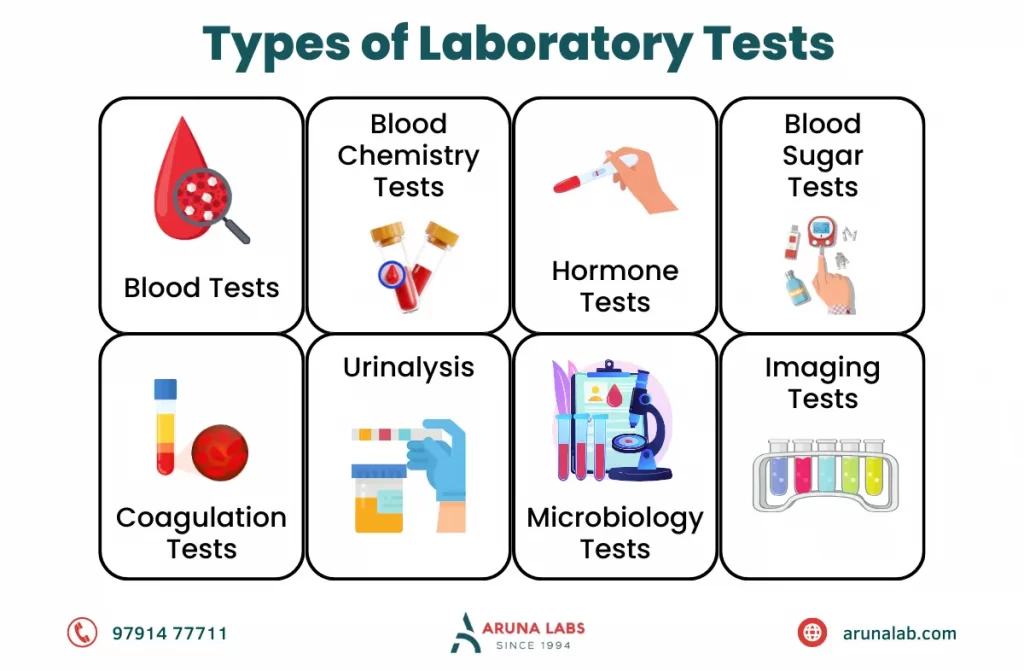Types of laboratory tests, laboratory tests are the cornerstone of modern medicine, enabling healthcare professionals to diagnose, monitor, and treat a wide range of medical conditions. They provide valuable insights into a patient’s health, guiding medical decisions and treatment plans. In this comprehensive blog post, we will delve into the world of laboratory tests, exploring the various types, their importance, and how they contribute to healthcare and well-being.
What are Laboratory Tests?
Laboratory tests are diagnostic procedures conducted on samples of bodily fluids, tissues, or other substances to gather information about a person’s health. These tests can help identify and assess various medical conditions, monitor treatment effectiveness, or screen for potential health issues. Common types of laboratory tests include blood tests, urine tests, and biopsies, with results used by healthcare professionals to make informed medical decisions.
Why Do Doctors Use Laboratory Tests?
Doctors use laboratory tests to aid in diagnosing medical conditions, assessing a patient’s overall health, and monitoring treatment effectiveness. These tests provide objective data by analyzing bodily fluids, tissues, or other samples, helping to identify diseases, determine their severity, and guide treatment decisions. They are essential tools for making accurate diagnoses and managing patients’ health.
4 Types of Laboratory Tests
Clinical Laboratory Tests
Clinical laboratory tests are the most common and encompass a wide array of diagnostic assessments. These tests play a crucial role in healthcare, assisting healthcare professionals in making accurate diagnoses, monitoring disease progression, and assessing the effectiveness of treatments. They are essential for understanding a patient’s health status and guiding medical decisions.
There are numerous types of laboratory tests, each serving specific purposes. Some of the most common categories of clinical laboratory tests include:
- Blood Tests: Blood tests, or haematological tests, are performed to assess various aspects of blood health, such as complete blood count (CBC), blood chemistry, and blood typing. These tests help diagnose anaemia, infections, and blood disorders.
- Chemistry Panels: Chemistry panels evaluate blood chemistry, including levels of glucose, electrolytes, and enzymes. They are essential for diagnosing conditions like diabetes, kidney disease, and liver function.
- Urinalysis: Urinalysis examines the composition of urine, detecting signs of kidney disease, diabetes, urinary tract infections, and more.
- Coagulation Studies: These tests assess the blood’s ability to clot and are crucial for patients on blood-thinning medications or with clotting disorders.

Microbiology Laboratory Tests
Microbiology laboratories focus on the identification and analysis of microorganisms, including bacteria, viruses, and fungi. Some common types of laboratory tests conducted in microbiology labs include:
- Culture and Sensitivity Tests: These tests grow and identify bacteria from a clinical sample, such as blood, urine, or sputum. Sensitivity testing helps determine the most effective antibiotics for treatment.
- Viral Load Tests: These tests measure the quantity of a specific virus in the blood, helping manage conditions like HIV and hepatitis.
- Mycology Tests: Mycology laboratories study fungi, diagnosing fungal infections through sample cultures and microscopic examination.
Pathology Laboratory Tests
Pathology lab tests involve the examination of tissues, cells, and bodily fluids to detect diseases and other health conditions. Let’s explore some common types of laboratory tests and their significance in healthcare.
- Biopsy: This procedure entails extracting a small tissue or cell sample for subsequent examination. It is crucial for diagnosing cancer and other tissue-related disorders.
- Cytology Tests: Cytology studies individual cells to identify abnormalities, often used in the early detection of cancer.
- Histopathology: Histopathology test involves the microscopic examination of tissue sections to identify diseases, such as tumours and autoimmune conditions.
- Liquid Biopsies: Liquid biopsies analyze bodily fluids, such as blood or cerebrospinal fluid, for genetic or molecular alterations indicative of cancer.
Molecular Laboratory Tests
Molecular laboratory tests focus on the genetic and molecular aspects of health. They include:
- DNA Sequencing: DNA sequencing identifies genetic mutations and variations, aiding in the diagnosis of genetic disorders and cancer susceptibility.
- PCR (Polymerase Chain Reaction): PCR is a technique for amplifying DNA, often used to detect infectious agents like viruses and bacteria.
- Genetic Testing: Genetic testing assesses an individual’s risk for genetic conditions and helps determine appropriate treatments and preventive measures.
Different Types of Laboratories
Types of laboratory tests are conducted in different types of laboratories, including clinical labs, research labs, and diagnostic labs. Clinical labs primarily focus on patient care, while research labs contribute to the advancement of medical knowledge. Diagnostic labs offer a range of tests for the detection and monitoring of medical conditions.
Conclusion
Laboratory tests are indispensable tools in the field of medicine, aiding in the diagnosis, management, and prevention of various medical conditions. Whether through clinical, microbiology, pathology, or molecular tests, these assessments provide essential information for healthcare professionals and patients alike. As technology advances, laboratory tests, including types of laboratory tests such as blood tests, urine tests, and imaging tests, continue to play an increasingly vital role in personalized medicine and healthcare decision-making.
We hope this comprehensive overview of different types of laboratory tests has been informative and helps you better understand their significance in healthcare. If you have any questions, experiences to share, or further insights on this topic, please leave a comment below. We look forward to engaging in discussions related to the diverse world of laboratory testing and its impact on healthcare and well-being.



